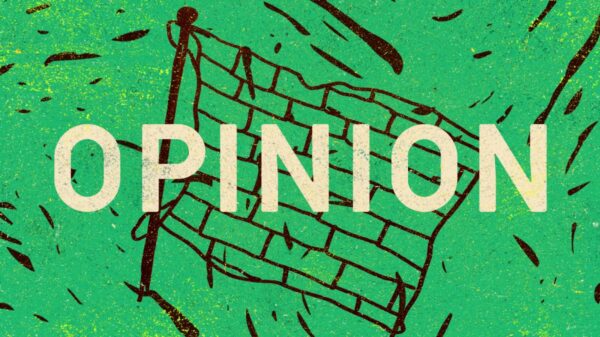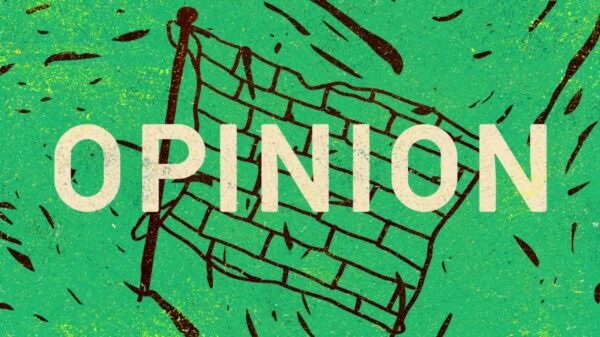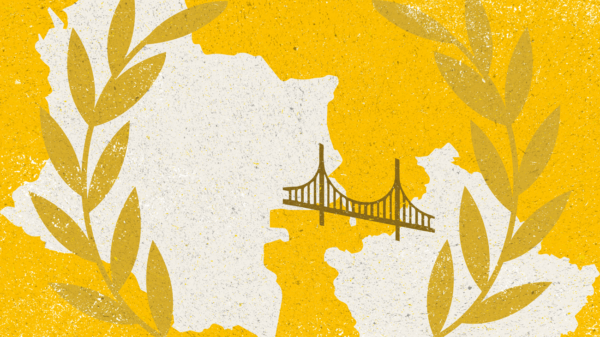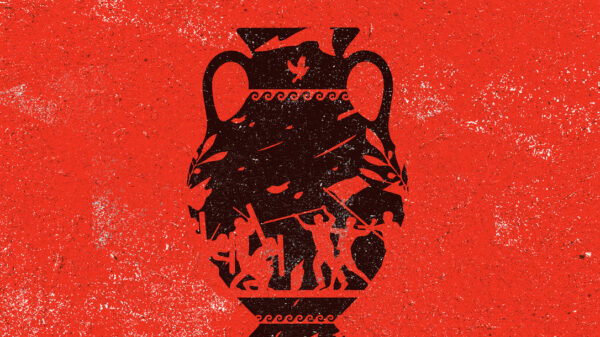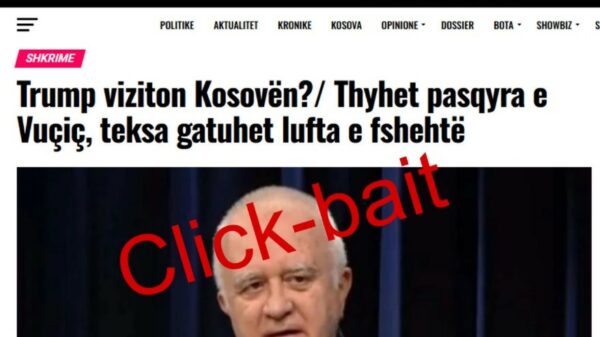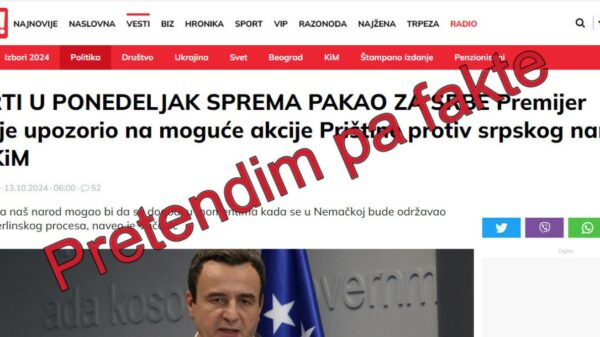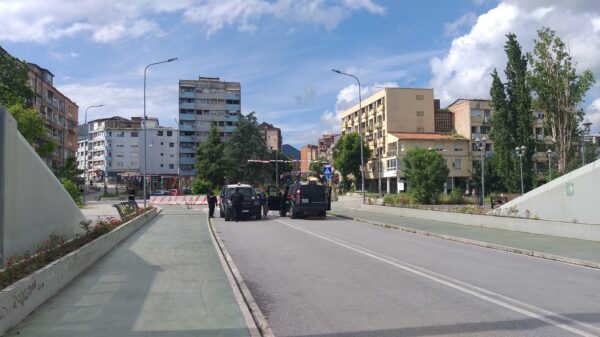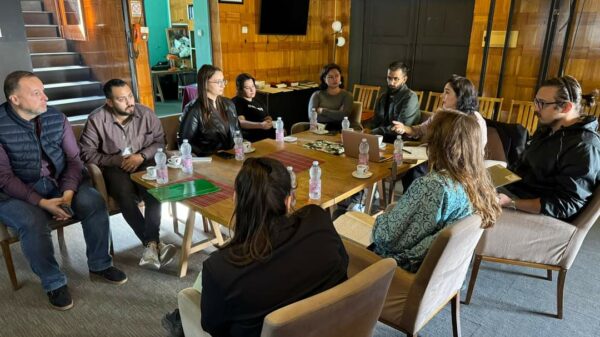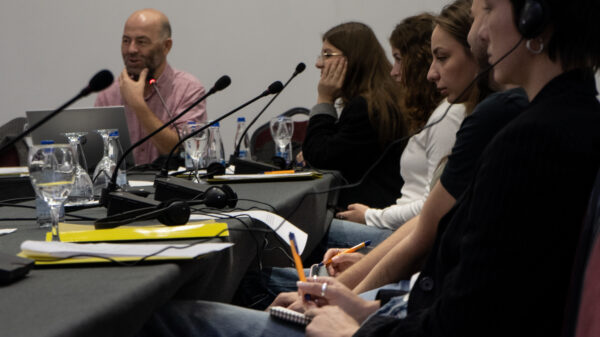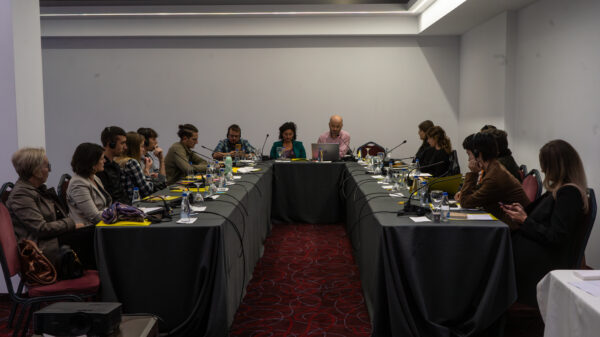Any crisis in the north of Kosovo could be briefly described as follows: the rise of tensions on the ground is proportional to the growth of disinformation. This formula is used by both Serbian and Kosovo media alike.
However, the problem with disinformation within the Kosovo Serb community is that it primarily misinforms the majority community. This consequently affects the rise of mistrust and inter-ethnic tensions.
Disinformation that concerns or affects the Serbian community in Kosovo is spread on three fronts: by political representatives, on social networks, and in the media.
High political representatives: how not to build trust
When it comes to political representatives in Kosovo, unfortunately, as is the case in Serbia, the highest officials are the ones who share disinformation.
One of the most striking examples of this was when Kosovo Prime Minister, Albin Kurti presented statistics in mid-May, which he believes confirm that there are no ethnic attacks in Kosovo.
“Official police statistics show that from '21 to '24, there are a total of 86 murders in 🇽🇰: 81 Albanians, 3 Serbs & 2 other ethnicities. 3 Serbs were murdered in '22; 2 in the municipality of North Mitrovica and one in Gracanica. There are only Serb suspects for all 3 murders,” reads the first message from the Kosovo Prime Minister's tweet.
Yet, his statistics focused on the number of slain Serbs in Kosovo in cases of domestic violence. Coincidentally or not, he omitted even mentioning the ethnically motivated incidents.
Do they exist? Yes, and that's what the statistics of the Kosovo Police say.
According to data of the Kosovo Police, a total of 14 inter-ethnic incidents were recorded in 2021, and 13 ethnically motivated attacks were recorded in 2022. Eleven were recorded from the beginning of 2023 to November of the same year. These are the data I collected in my earlier text.
Social networks: a place to disseminate disinformation and spread fear
When we talk about social networks, Serbs in Kosovo have access to all social networks, with Telegram channels being particularly popular. Unfortunately, some are fertile ground for the spread of disinformation and fear.
The most recent example comes from June 23rd of this year.
A message was published on the "Koridor" Telegram channel that Albanians were planning to open the main Mitrovica bridge.
"We invite all Serbs, especially the citizens of Mitrovica, Kosovo, to gather at the main bridge on the Ibar at 10:30 a.m.!!" - reads part of the message. The message that employees of Serbian institutions in Mitrovica received from their superiors during the day to “be on standby” further contributed to the dissemination of disinformation.
After the message was shared on the aforementioned Telegram channel, I spent several hours near the main bridge, determining that there were no signs that the bridge was opening.
I also wrote about that in my earlier text.
It should be noted that disinformation is also spread among Albanian users of social networks, particularly on Twitter. (example I, example II).
(Non)Media
During the media monitoring I carried out from December 2023 to the end of May 2024 through a project implemented by Kontakt Plus and Alternativna, financed by CFI, including tabloids, pro-governmental media in Serbia, and media that report in the Albanian language in Kosovo, we spotted a trend: Serbian tabloids and pro-governmental media use the topic of Kosovo to divert attention from disagreeable topics for the Serbian government and to spread fear and a negative narrative about the Kosovo government.
Informer, Sputnik Srbija, Srpski telegraf, Alo, Republika, Novosti, Politika, Srbija danas, B92, and Happy are some of the tabloids and pro-governmental media included in the "Red List" of the two initiatives that fight against fake news in Serbia: Raskrikavanje and Fakenews Tracker
These initiatives tackle fake news and disinformation daily and clearly highlight what the pro-governmental media and tabloids are doing in the media sphere.
The situation, however, is different in Kosovo.
There are initiatives to debunk fake news and disinformation in the Serbian community, thanks to the support of international donors. Yet, most initiatives deal with disinformation sporadically; it is not being done on a daily basis. One of the initiatives that did this was led by Kontakt Plus within a project carried out in cooperation with Alternativna. This initiative was also specific in that it followed news related to Kosovo and of interest to the Kosovo Serb community.
A team of journalists worked on debunking disinformation daily. Over 90 pieces of disinformation were debunked within 6 months, meaning that at least one piece of disinformation concerning Kosovo or the Serbian community in Kosovo was published every other day. (I repeat, we followed the pro-governmental media and tabloids in Serbia and the media reporting in the Albanian language in Kosovo).
On the other hand, we collected more disappointing data.
The disinformation that concerns the Serbian community in Kosovo and that can affect inter-ethnic relations between Serbs and Albanians is terrifying. Unfortunately, some media reporting in the Albanian language are directly involved in this.
Examples
On March 17, the Kosovo Radio-Television portal published a text about the March violence. Despite international reports criticizing RTK for inflammatory reporting and unverified claims ahead of the March violence in 2004, which is considered one of the triggers of this violence, RTK published a controversial, manipulative, unprofessional, biased and incomplete text on the anniversary of the March violence. The public was completely misinformed about the causes and consequences of this violence. I wrote about that in an earlier text.
Indeksonline published an article in mid-February titled "Exclusive/It is suspected that Serbian forces entered the territory of Kosovo, the citizens say that they pointed a gun at them". KFOR and the Kosovo Police denied these allegations.
The third example is also the most extreme one.
"Serbian secret services are planning terrorist attacks on Serbs in Kosovo," read the shocking and dramatic title of the text published by the Kosovapress agency on January 5th of this year.
On the same day, Agim Musliu, a self-proclaimed security expert, shared identical claims on the social network "X". The alleged attack is being prepared by Serbian President Aleksandar Vučić, and Serbian Patriarch Porfirije is conducting "spiritual preparations" on the ground.
The claims were contrary to what was happening on the ground because the Serbian patriarch met with the mayor of Peć/Pejë, Gazmend Muhaxheri, in the Patriarchate of Peć/Pejë. The messages shared by the Serbian patriarch in Kosovo were in complete contradiction to the allegations from the aforementioned media and Musliu's tweet. At the time, the Serbian patriarch said, among other things, that people should "forgive and pray to God for peace with the Albanians."
Conclusion
Current initiatives are not enough to fight disinformation. The fight must be done on two fronts: by strengthening initiatives to uncover disinformation to deal with it on a larger scale and by strengthening professional and objective media.
Portraying the other side as the enemy and the main culprit for problems in society is the way political elites remove responsibility from themselves and manipulate public opinion. It is easier to widen the gap between those who are trying to build coexistence, damaged by war, than to take bold steps towards reconciliation. Some unprofessional media unfortunately participate in that and have a direct impact on the rise of inter-ethnic distrust and tensions.
The article was prepared by Sbunker as part of the project “Strengthening Community Resilience against Disinformation” supported through the Digital Activism Program by TechSoup Global.





